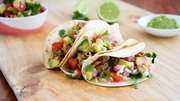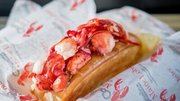Article
Foodservice leaders tout inclusive cultures to quell 'labor pains'
Inclusion and diversity are more than HR catchwords when it comes to restaurant staff. Leaders of four restaurant brands say brands that truly embrace these as cultural imperatives also harness the power of some of the best labor retention tools available in a squeaky-tight restaurant labor market.

January 9, 2020 by S.A. Whitehead — Food Editor, Net World Media Group
Editor's Note: An earlier version of this article ran in QSRWeb.com, a sister publication of Food Truck Operator.
 |
Chronic Tacos' Michael Mohammend, Chi'Lantro's Jae Kim, BurgerFi's Steve Felson and Ballard Brands Bill DiPaola discuss staff inclusiveness. Photo by Willie Lawless. |
With foodservice industry employee turnover last year pegged right under 75%, according to the National Restaurant Association, and some brands reporting far higher numbers, it's clear that the workplace culture of any given brand must not only be good enough to create the kind of marketplace buzz that attracts new workers, but also capable of keeping those in-house already for as long as possible.
And here, brands who "fake it 'til they make it" or otherwise make false promises about a culture they really haven't actually made happen not only won't be taken seriously, but will probably also suffer the anger and losses that a hopeful, but temporarily duped workforce can inflict.
"Your culture needs to be strong enough to repel people. … If it's not strong enough to repel some people you don't really want it. You can't be what you can't see."
Ballard Brands Bill DiPaola
The need for the real thing — a truly diverse and accepting foodservice workplace — drove an often passionate discussion among a handful of executives this fall on the subject of restaurant workplace culture at the Fast Casual Executive Summit in Austin, Texas. The brands and executives involved in the discussion included:
- Jae Kim, founder of Chi'Lantro, an Austin, Texas based Korean barbecue food truck, restaurant, and catering company.
- Ballard Brands (PJ's Coffee, Wow American Eats and other brands) COO Bill DiPaola.
- BurgerFi International Executive Vice President, Business Operations, Steve Felson.
- Chronic Tacos CEO Michael Mohammed.
Thanks in large part to the insightful prompts from moderator and PlayerLync Head of Product Paul Bradley, the four executives shared plenty of candid thoughts about these sometimes sensitive issues, beginning with their responses to Bradley's probes about how each brand incorporates diversity and inclusion into their overall training to ensure those qualities become a workplace cultural mainstay.
To that subject, Chi'Lantro's Jae Kim was quick to admit that when he first began his business, he just hired people he liked for a pretty compelling reason.
"In a food truck, where you've got four people in like 300 square feet with a ton of stress … I only hired people I enjoyed working with," he said. "Now it's about D.A.R.T. — Dependable, Authentic, Reliable, Trustworthy. Now I hire and fire around those four cultural traits."
To that, DiPaolo explained that at brands like PJ's Coffee he has found that brand culture needs to be almost "over-defined" to really attract those who are good cultural "fits."
"Your culture needs to be strong enough to repel people. … If it's not strong enough to repel some people you don't really want it," he said, stressing that a brand's workplace culture has to be lived and breathed by all team members from dishwasher to c-suite because, as he put it, "You can't be what you can't see."
Critical to culture now: inclusion
As far as how the culture that employees "see" is created, these restaurateurs all said this must be an area where all players are included in the creation process. The panelists said the most well-defined cultures take the time in the formative stages to include input from all team members.
To these four leaders, that process cannot be circumvented or glossed over.
"Culture is the sum total of our actions," BurgerFi's Felson told the room of restaurant executives. "There need to be leaders in the industry and the brand … but then you should include everybody in the process.
"You have to ask people, 'What do you want here?' … You have to take everyone's ideas into consideration and you have to live it … because every employee you bring into the organization is a potential culture-killer or culture-changer. That's why it's important to look at it every day."
DiPaolo agreed, but added that he believes that the only real way to grow culture is by imbuing a company's top executives and managers with a kind of servant leadership mentality that prods them to literally grow the culture through living, breathing, on-the-job examples of desired behaviors in action.
"With leadership — as it relates to rank and file — we are really the gardeners and they are the trees," he told the group. "From there is where everything good comes. If we don't acknowledge that we're of service to them, then that culture will never penetrate."
Inclusivity imperative: franchisees
Similarly, those kinds of thoughts extend to a brand's approach to its selection of franchisees, which at Chronic Tacos has left the door open to every variation of business operator and human being, regardless of sexuality, race, gender or any other characteristic, according to Mohammed.
"For us, it's really about having an open mind when it comes to choosing franchises," he said. "So we've created an environment where that exists … and you're going to see that. You can train job skills, but you can't train a perspective after all."
"Culture is the sum total of our actions. There need to be leaders in the industry and the brand … but then you should include everybody in the process. You have to ask people, 'What do you want here?' … You have to take everyone's ideas into consideration and you have to live it."
-BurgerFi's Steve Felson
BurgerFi's Felson agreed, adding that once professed by a brand, such a perspective had better be genuine. That's because brands that "fake it" will neither "make it" with employees and prospective employees or ultimately, customers.
"The biggest thing you can do is treat people well and then they will buy into the culture," he said. "When you don't … then they go out and create their own culture … and if you don't treat them in a way that provides value, they will also go out and create their own value, too."
Or as DiPaolo put it, "They will smell it out if you are false," adding that at PJ's Coffee, the brand's use of technology helps drive home the authenticity of leadership's commitment to inclusiveness.
"The tech we use helps carry that idea across a lot," he said. "Also, it shows in the images that are chosen, the clothes you wear — we are in so much more of a visual world. … That's the whole principle of, 'You can't be what you can't see.'"
"With all the tech you can use … your customers and employees will sniff out something that's not authentic like that. And when we sit down with the franchisee they have to see what you're about … so they can get behind that."
-Chronic Tacos' Michael Mohammed
He said at PJ's Coffee, the brand creates its employee-facing technology video in-house to ensure the desired cultural priorities come through loud and clear. Felson and Chronic Taco's Mohammed also agreed that the images a brand uses with both its internal and traditional customers is critical to connoting the brand's commitment to diversity and inclusiveness.
"Just look around," he said of the videos and the way they reflect these characteristics and other essential traits of BurgerFi's employees. "The people we hire are not sitting around and looking at magazines and newspapers.
"Also, the most important thing you can do, as far as your video content is concerned, is shorten it up because that's what people want. … And they want to feel included and say, 'This resonates with me.'"
Mohammed said that level of cultural authenticity is also essential in those initial meetings with franchisees and potential franchisees.
"With all the tech you can use … your customers and employees will sniff out something that's not authentic like that. And when we sit down with the franchisee they have to see what you're about … so they can get behind that."
'MeToo' effect
Authenticity is also absolutely demanded around career path and advancement issues, as well as overall brand sensitivity regarding workplace sexual harassment. The all-male panel involved in this particular discussion, in fact, said since men are often the most numerous players in any given setting, brands have to make special effort to consistently "widen the view."
In that respect, the many recent issues and incidents around the so-called "MeToo" movement have served to heighten sensitivity around what has been "business as usual" in a business world that has tended to afford more access to white men over other segments of the population.
Felson said at BurgerFi, "It's really just created awareness and informed what we do," he relayed, using an example from the past where a posted position failed to garner a single female applicant. "So people said, 'Look at the wording in your job descriptions!'
"So, as four males on this panel, we've learned and been brought up in a certain way, but it's important that you go out and get different views from different backgrounds and … fill the room with different opinions purposely. Then ask people who use what you create, 'does this work for you?'"
At Chi'Lantro, Kim said that the well-publicized issues brought to light around the trials many women face on the job really prompted him to think about the effect women have had on the brand, which he believes has in many ways been at least as pivotal as that of men, if not more so.
"They (female team members) bring so much more value to our company and it gives us such a dynamic and strength, and I really want to grow that," he said.
In the final analysis, a healthy dose of sensitivity was viewed by all these restaurateurs as being essential to running an inclusive and culturally attractive limited-service brand today. That involves everything from knowing, appreciating and even celebrating the differences across a brand's labor pool, to choosing representative images and even technological translation tools that are sensitive to regional variances in the way people speak.
Inclusion and cultural diversity in any given brand are, in short, a kind of rolling responsibility that leaders need to be especially keen to staying on top of, so that the people who work across a given brand not only feel like they have a great place to work and practice their skills, but also that their individual skills and personality are key in creating the brand's big picture.
That, said Chronic Taco's Mohammed, is about a lot more than just following the rules.
"There are obligations on employers to have the right compliance training … but we all have to do a better job of recognizing the value of diversity, rather than it just being an obligation," he told the session's participants. "That encourages (diversity) to be a part of your culture.
"So, yes, you have to be compliant. But it's more than what you just have to do, but recognizing there is real value in that."
About S.A. Whitehead
Pizza Marketplace and QSRweb editor Shelly Whitehead is a former newspaper and TV reporter with an affinity for telling stories about the people and innovative thinking behind great brands.
 ChatGPT
ChatGPT Grok
Grok Perplexity
Perplexity Claude
Claude





